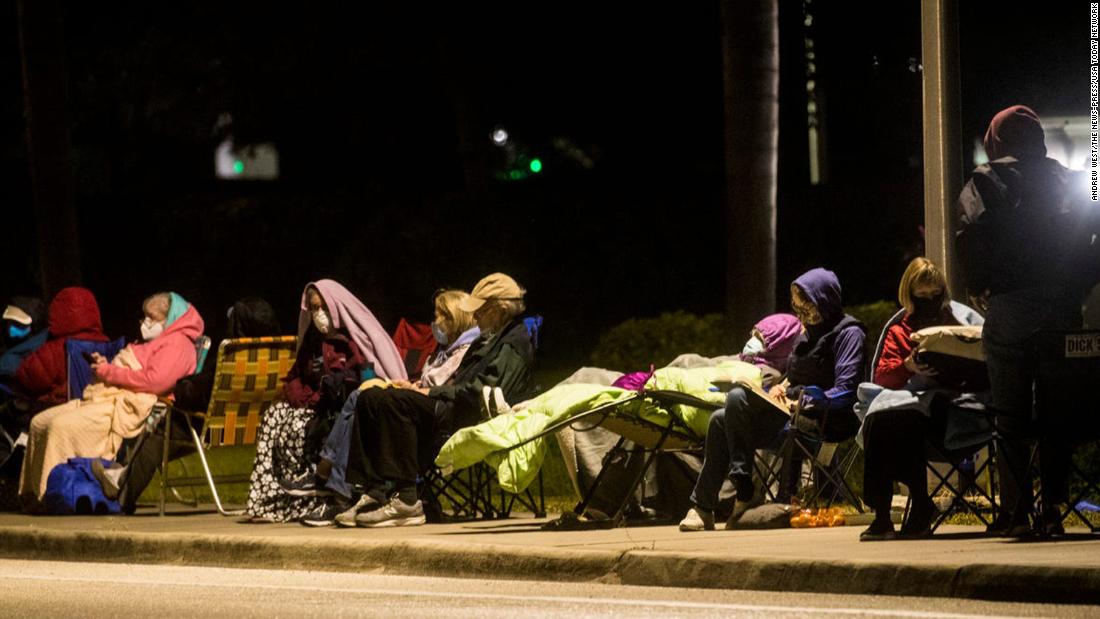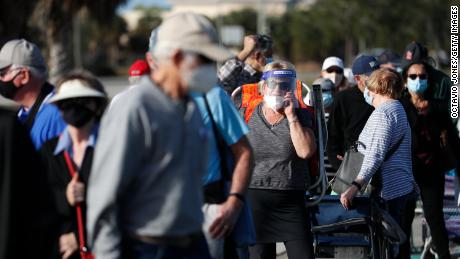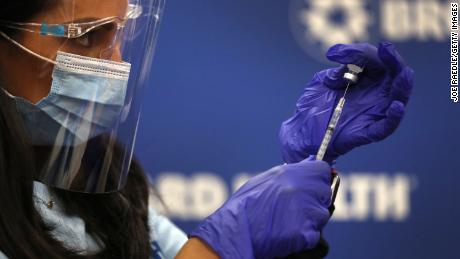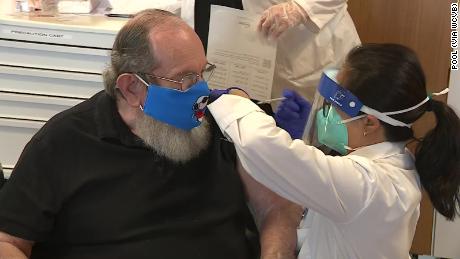The first-come, first-served approach led to long lines forming as people camped out on lawn chairs for hours
The first-come, first-serve plan led to huge lines forming overnight Tuesday as people camped out on lawn chairs and waited for hours.
Bruce Scott told CNN he arrived at a Ft. Myers vaccination site at 1:30 a.m. and waited in a line for about 8 or 9 hours to get vaccinated.
“Although I’m grateful to get the vaccine, I feel that there’s got to be a better way to distribute this,” he said afterward. “For people that really need it, elderly that might be disabled in some way, they can’t endure this process, so there’s got to be a better way to manage this.”
The long wait is a preview of what looks to be a tumultuous vaccine rollout and reflects the public’s pent-up demand for vaccines as well as the logistical difficulty in administering them in an orderly way.
Florida is one of the few states that has begun vaccinating people beyond the first wave of health care workers and long-term care facilities. The state has administered over 150,000 vaccines so far, more than all but Texas, according to data from Johns Hopkins University.
Counties see huge vaccine demand
Other Florida counties have tried to set up vaccination appointments for those who sign up online or through a hotline.
Fran Lundell, 70, and her husband, Andy, 73, were among those who successfully signed up, and they were vaccinated after waiting in their cars at the Orange County Convention Center in Orlando on Tuesday.
They said they went to the county website to schedule an appointment as soon as it was announced. Fran got an appointment quickly, but it took Andy four or five attempts to get a slot.
“We think we’re lucky,” Fran Lundell said. “We thought maybe March or April we might get it, but this is fantastic to get it, certainly.”
Jim Seltzer, who was also vaccinated Wednesday, praised the job the county did.
“I thought it was very well organized. I thought they did an excellent job,” he said. “I mean, it was a long wait, but you know, I expected that.”
“We are working on expanding our infrastructure to handle the high demand we are experiencing,” the site said.
And in South Florida, Broward Health said all of its appointments are booked until February.
Mount Sinai Hospital in Miami Beach says they have proactively reached out to the seniors in their community to sign up for the vaccine. They have enabled more appointment phone lines in an effort to prevent seniors for easily accessing the vaccine.
“And so the faster that we’re able to deploy vaccine to the 65 plus year old population, I believe that life will return to normal. And I also believe that younger people will be more receptive to receiving the vaccine as well,” said President and CEO of Mount Sinai Miami Beach Steve Sonenreich.
Focus on elderly over essential workers
A CDC advisory committee recommended that states first vaccinate frontline health care workers and people in long-term care facilities, and Florida has followed that.
The CDC committee then recommended that states vaccinate people older than 75 and “frontline essential workers” such as first responders in a “Phase 1b.” Afterward, in a “Phase 1c,” states should vaccinate adults ages 65-75, people ages 16-64 with high-risk medical conditions, and “other essential workers,” the committee recommended.
However, DeSantis said the state is prioritizing everyone over age 65, with young essential workers later.
“If you’re a 22-year-old working in food services, let’s say at a supermarket, you would have preference over a 74-year-old grandmother,” he said. “I don’t think that that is the direction that we want to go.”
CNN’s Rosa Flores, Sara Weisfeldt and Denise Royal contributed to this report.
![]()








